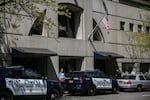
The Portland Police Bureau.
Abigail Winn / OPB
The U.S. Department of Justice is backing a new task force aimed at addressing a spike in shootings and homicides across Multnomah County.
The new partnership will bring together local police agencies across the county and federal law enforcement like the FBI and the Bureau of Alcohol, Tobacco, Firearms and Explosives.
As many as 24 police officers from Gresham, Portland and the Multnomah County Sheriff’s Office will be deputized as federal officers. The vast majority — as many as 20 officers — will come from the Portland Police Bureau. They’ll work alongside five FBI agents and five ATF agents assigned to the task force. Oregon’s U.S. Attorney’s Office and the Multnomah County District Attorney’s Office will provide consultation for the officers working cases.
“These agreements bring resources to the city to bring overtime costs, equipment costs that will be really helpful in terms of us investigating as many of these cases as possible,” Multnomah County District Attorney Mike Schmidt told OPB.
Schmidt said there currently aren’t enough Portland police detectives to investigate all the shootings happening in the city.
“They’re spread thin and being forced to triage the cases that they are working,” he said. “We’re seeing some cases that are just not being worked because PPB’s resources are spread so thin.”

District Attorney Mike Schmidt.
Bradley W. Parks / OPB
Portland is on pace to shatter previous gun violence records. As of April 6, there have been 284 shootings, which have left 91 people injured and 18 dead. There have been 25 homicides in total. At the current rate, the city will easily surpass the previous record of 70 homicides in a year, set in 1987.
The rise in homicides and gun violence isn’t unique to Portland. After decades of declining violent crime rates, communities of all sizes and demographics saw startling reversals as gun violence increased dramatically during the past year. The Gun Violence Archive, which tracks shootings in real time using law enforcement, media, government and commercial sources, estimates there were an additional 4,000 gun homicides in 2020 compared to 2019, a rise some experts estimate would be the largest single-year increase on record.
“The level of gun crime, the level of violent crime that’s happening right now, can’t be allowed to continue,” said Kiran Ramsey, special agent in charge of the Portland FBI field office.
Ramsey said he hopes this task force strikes a delicate balance.
“Collectively we’re experiencing a public health crisis, we’ve got a mental health crisis, we’ve got a funding crisis, we’ve got a reimagining of law enforcement all within this context of a social justice movement that is so warranted,” he said. “All forces are coming together at once, creating rightful demands for justice and change, but at the same time we’re seeing this spike in violence.”
Law enforcement officials backing the initiative say they’re aware of previous efforts to curb gun violence that have disproportionately policed people of color, especially in Portland, and have vowed this effort is different and narrower in scope.
During last summer’s massive protests for racial justice, the Portland Police Bureau Gun Violence Reduction Team, which used to be called the Gang Enforcement Team, was a target for activists and was ultimately defunded. Critics had decried the team’s exclusive focus on Black and Latino gangs while ignoring neo-nazis and other white gangs. After a city auditor report found the team disproportionately stopped Black people, the bureau rebranded the group and expanded its role to respond to every shooting in the city instead of only responding to gang-related shootings.
Related: Audit: Data fails to prove Portland gang enforcement patrols 'effective'
The Gun Violence Reduction Team also worked to stop cycles of retaliation, with the goal of preventing shootings before they happened. But shootings and homicides have remained constant or increased since the team’s formation, leaving little data to suggest the program was successful at curbing gun violence. Similar programs across the country have had variable success.
“This is different,” Schmidt said. “The main way this is different is, we’re talking about investigations. This is about shell casings on the ground, bullets in the air, and law enforcements called out.”
Schmidt said the new task force won’t profile and stop people.
“This is going to be tied tightly to when there’s been a gun crime that has happened. How do we work that case, in order to interdict a continuing perpetuation of the violence in the community?” Schmidt said. “This is not the same thing at all as the GVRT model. This is tied tightly just to doing the investigative side.”

Portland Police Bureau vehicles parked in downtown Portland.
Bradley W. Parks / OPB
While some in the city point to disbanding the gun team as a contributing factor for the increase in shootings, there is little evidence to support that theory. Shootings and homicides had started slowly ticking up before last summer and the nationwide increase suggests other factors. What those factors are, however, remains a puzzle.
In the early months of the pandemic, gun sales were up 85%, according to the industry research firm Small Arms Analytics. Between March and May 2020, there were an estimated 2.1 million excess firearms purchases across the country, many to first-time buyers. That surge in gun purchases can be linked to an 8% increase in gun injuries and fatalities according to researchers at UC Davis.
COVID-19 shutdowns also meant community groups charged with outreach and violence intervention were hampered in doing their work.
“I don’t think that anybody has held up well, as it pertains to COVID,” said Reygan Cunningham, senior partner at the California Partnership for Safe Communities, a violence reduction group advising Portland city leaders. “Specifically with strategies that require more face-to-face contact with people, ... that can’t be done well over a computer. That has to be done face-to-face.”
Schmidt said he agrees the pandemic has “shredded” the safety net for many.
“There’s not a law enforcement solution to this problem,” he said. “We’re just one piece of the big puzzle.”
Exactly when the federal task force would start, how long it would last and the financial commitment from the U.S. Justice Department weren’t immediately available Tuesday morning. Schmidt estimated that the overtime contribution of local officers would cost somewhere around $300,000 to $500,000.
Last week, the Portland City Council voted to spend $6 million on efforts to reduce gun violence, but made pains to ensure new funding would not go to the police bureau, whose budget was reduced by $15 million as part of a series of demands made by racial justice protesters last summer.
As part of the city’s plan, Mayor Ted Wheeler, who is also Portland’s police commissioner, convinced City Council to support his plan to reassign 12 officers and two sergeants to form a new gun violence intervention team.
Related: Portland approves $6 million plan to prevent gun violence
Despite city and county leadership at all levels saying the city’s new program does not resemble previously criticized police units focused on gun violence, after the plans are implemented the city will have, in essence, revived the Gun Violence Reduction Team less than a year after disbanding it.
Schmidt estimated that more than 95% of the cases investigated by the task force will move through his office, rather than heading to federal prosecutors.
“If cases go federal, I think that that’s going to be in consultation with this office,” he said.
Schmidt acknowledged he was elected to do things differently, especially when it comes to using non-carceral solutions to address community issues like addiction, houselessness and mental illness.
“I don’t hear the same thing for gun violence,” Schmidt said. “When somebody shoots someplace, people expect that the police will respond, that there’s an investigation, that there’s accountability and a prosecution.”